How to Change Colors in Crochet Like a Pro [Video Tutorial]
- Erdem Gursoy
- May 5, 2023
- 10 min read
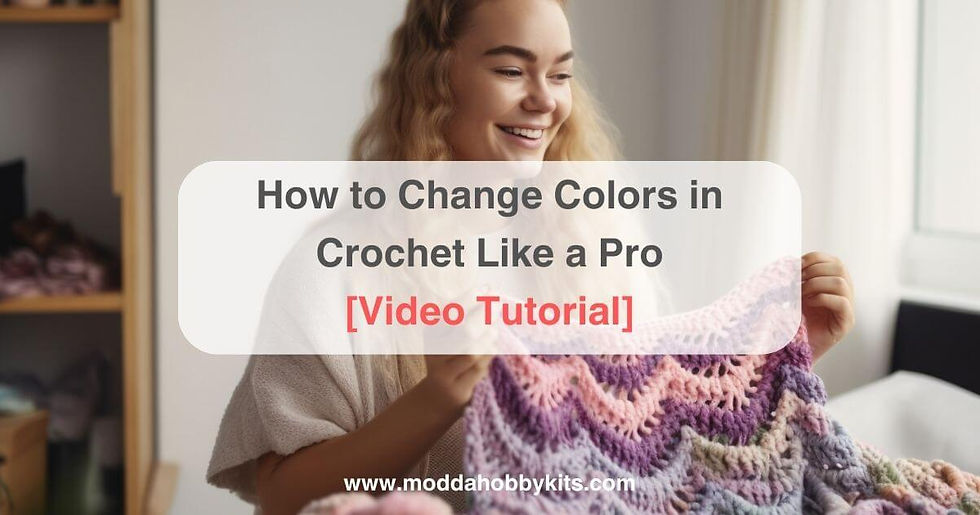
Crochet enthusiasts know that the beauty of their creations often lies in the masterful use of colors.
If you're looking to expand your crochet skills and learn how to change colors seamlessly, you've come to the right place! In this blog post, we'll explore various techniques for changing colors in rows, rounds, and stitches to achieve colorful patterns and designs.
Whether you're working on a granny square or an amigurumi project, our handy tutorial will guide you through each step.
Key Takeaways
Changing yarn colors in crochet can be done in rows, rounds, and different stitches to create visually appealing designs.
Choosing the right yarn color, the size of the crochet hook, and using sharp scissors are important tools and techniques when changing colors in crochet.
Weaving in ends neatly is crucial to prevent your project from unraveling after all your hard work.
Advanced techniques like Intarsia Crochet, Tapestry Crochet, and Stranded Colorwork allow for intricate and complex designs with multiple yarn colors.
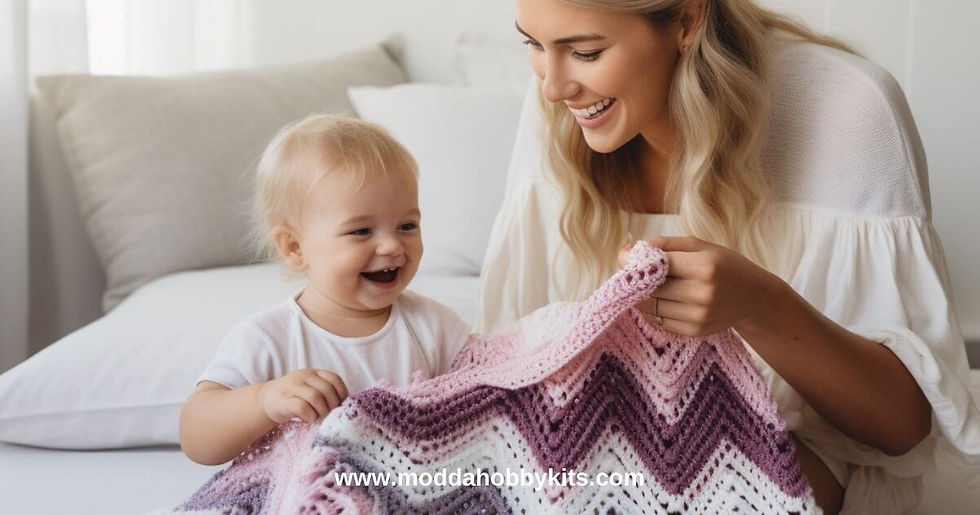
Understanding Color Changes In Crochet
In crochet, there are different ways to change colors such as in rows, rounds, and with different stitches.
Changing Colors In Rows
Changing colors in rows is an essential skill for any crocheter looking to create stunning and visually appealing pieces.
This technique allows you to add a pop of color, design intricate patterns, or simply give your crochet project some extra flair.
To change colors seamlessly within a row, stop right before the last loop of the current stitch remains on your hook. Then, bring in your new yarn color and hold it alongside the old one.
Make sure both tails are at least 4-6 inches long for easy weaving later on.
Yarn over with the new color and pull through all loops on your hook to complete the stitch – this ensures that there’s no gap or visible knot when transitioning between shades.
Continue crocheting with the new shade as usual until it's time for another color change or you reach the end of your row.
Changing Colors In Rounds
To change colors in crochet rounds, the process is slightly different from changing colors in rows.
When reaching the last stitch of a round with the old color, work up to the last yarn over before completing the stitch.
Then, drop the old color and pick up the new color, making sure to leave a long tail that can be woven in later.
It's important to keep track of where each round starts and ends when changing colors in rounds.
To help with this, some crocheters use stitch markers or scraps of yarn to mark their starting point.

Changing Colors With Different Stitches
Changing colors in crochet is not limited to one type of stitch.
It can be done with any stitch, including single crochet, double crochet, and even more complex stitches like shell or popcorn stitches.
The key is to stop working with the current color before completing the last loop of the current stitch and start with a new color on that same loop.
This ensures that there are no loose ends or yarn tails left behind while seamlessly blending two different shades.
For example, when crocheting a granny square pattern, each round may require changing colors from one row to another using different stitches such as chain stitches or clusters.
Tips And Tools For Changing Colors In Crochet
Choosing the right yarn colors, selecting the appropriate crochet hooks, using sharp scissors for cutting yarn, and properly weaving in ends are all essential tools and techniques to consider when changing colors in crochet.
Choosing The Right Yarn Colors
Selecting the right yarn colors is crucial when it comes to changing colors in crochet.
To create a harmonious look, choose colors that complement each other on the color wheel or opt for contrasting shades if you are looking for a bold and vibrant design.
If you prefer a more subtle look, consider using tints and tones of the same hue.
For instance, if you are making an amigurumi toy with tightly stitched rows of single crochet stitches, lighter-weight yarns will work better than heavier weights of the same color as they will give more definition and help make your stitches stand out.
Similarly, textured or variegated yarns can add depth and interest to your projects while solid-colored ones provide clean lines that showcase stitch designs.

Selecting The Right Crochet Hooks
Choosing the right crochet hook is an important factor when it comes to changing colors in crochet. The size of the hook will depend on the thickness of your yarn and the desired tension of your project.
A small hook can help create tight and dense stitches, while a larger one can make looser and more relaxed ones.
It's also worth noting that different materials can impact how well your hooks glide through your yarn.
Aluminum or plastic hooks tend to be less expensive but may not have as smooth a finish as wooden or metal ones.

Importance Of Sharp Scissors
Sharp scissors are an important tool to have when changing colors in crochet. This is because they allow for clean and precise cuts which help to minimize the amount of yarn waste while weaving in ends.
Dull scissors can cause frayed edges, making it difficult to thread the needle through and secure the yarn properly.
Investing in a good pair of sharp scissors will not only make color changes easier but will also improve the overall quality of your crochet work.
Weaving In Ends And Securing Yarn
After changing colors in crochet, it's essential to secure your yarn ends and weave them in neatly.
You don't want your colorful masterpiece unraveling after all your hard work! To do this, start by cutting the old color yarn leaving a tail of about 4-6 inches.
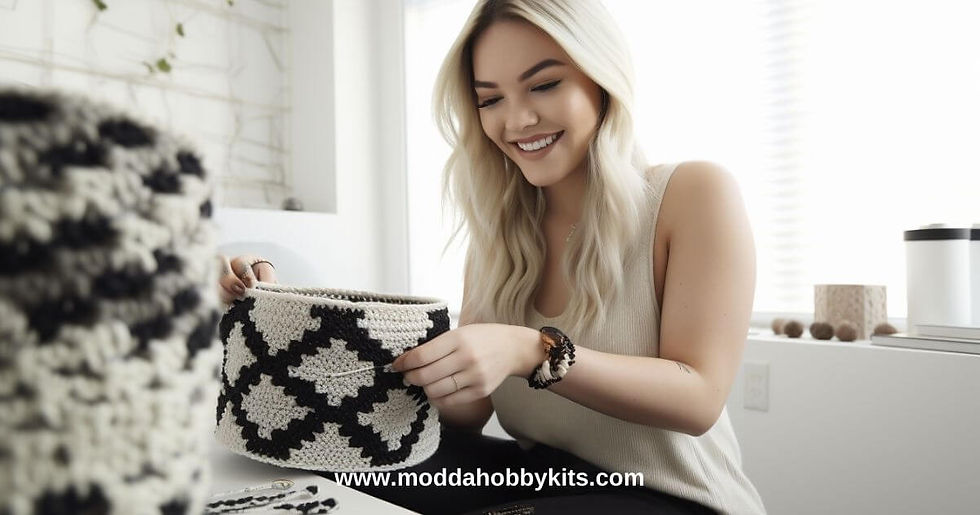
Then, take a tapestry needle and weave the tail through the stitches of your work for at least an inch or two. Repeat the process with the new color yarn tail.
An excellent tip is to stop weaving when you feel like you are forcing the needle through too many stitches as this can cause puckering on your finished project.
Crochet projects often have multiple tails due to changes in color or joining new pieces together - so always make sure to use sharp scissors to cut them cleanly for ease of sewing later on.
Step-by-Step Guide On How To Change Colors In Crochet
Learn the easy and straightforward process of changing colors in crochet with our step-by-step guide, complete with helpful tips and detailed instructions.
Preparing For The Color Change
Before you start changing colors in your crochet, it's important to have all the necessary materials on hand.
You'll need to have both of the yarn colors you plan on using, as well as the appropriate size crochet hook for your project.
Next, take a moment to review your pattern or design so that you know exactly where and when to switch colors.
To make switching colors easier, consider winding each skein into separate small balls ahead of time so they don't get tangled up with each other.

Finishing The Last Stitch With The Old Color
To finish the last stitch with the old color before changing colors in crochet, simply stop crocheting right before pulling through the final loop.
Then, drop the old color and pick up the new one to complete the last step of that stitch with the new color.
This ensures a clean and tidy switch between colors without leaving any loose ends or knots.
For example, when creating a granny square in alternating colors, finishing each round by dropping the old color will create neat corners and seamless transitions between rounds.
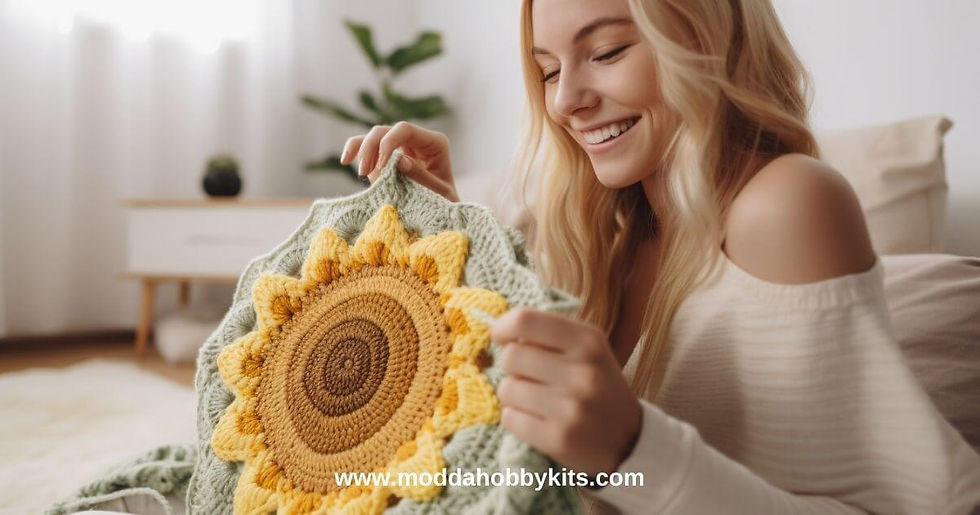
Starting The First Stitch With The New Color
Once you have finished the last stitch with your old color, you are ready to start the first stitch with a new color.
Take the new yarn and make a slip knot on your hook.
Place the loop of the slip knot over your working yarn and tighten it onto your hook. Then, insert your hook into the next stitch and draw up a loop with your new color yarn.
It's important to keep an eye on how tightly you are pulling the new yarn when starting a new row or round as this can affect tension and cause puckering or distortion in the final piece.
To ensure that both colors look evenly spaced throughout, make sure to adjust any slack from changing colors before continuing with your pattern.

Weaving In Ends And Tidying Up
Once you have finished changing colors in your crochet project, it's important to weave in the ends to tidy up the loose yarn.
To do this, simply thread a tapestry needle with the tail of the yarn and weave it through a few stitches on the wrong side of your work.
Then snip off any excess yarn with sharp scissors, making sure not to cut any nearby stitches.
It's also important to secure your new color when starting a new row or round by weaving in the end similarly as mentioned above.
This ensures that there are no gaps or holes where the new color begins and prevents any unraveling or tangling of yarn later on.
Advanced Techniques For Changing Colors In Crochet
Advanced techniques for changing colors in crochet include Intarsia crochet, which involves using different colored yarns to create intricate patterns within a larger design, tapestry crochet where multiple colors are carried throughout the piece without being cut off and stranded colorwork where two or more contrasting colors of yarn are used at once.
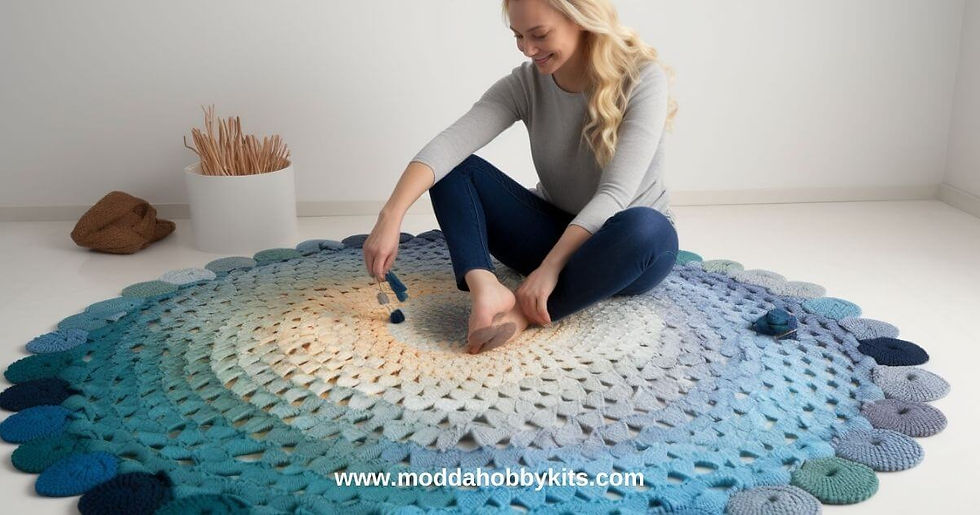
Intarsia Crochet
Intarsia crochet is a technique used to create larger color blocks and designs within a crochet project.
This method involves working back and forth in rows with different colored yarns, but unlike other methods of changing colors, the unused strands are not carried along the piece.
To work intarsia crochet, it's important to plan out the design beforehand so that you can determine where each color block will go. You'll need to have one ball of yarn for each color you want to use in your design.
One advantage of intarsia crochet is that it creates a clean and professional look without any visible floats on the backside of your work.
With these simple techniques and tips on how to change colors in crochet including Intarsia Crochet, you're well on your way towards creating beautiful multi-colored projects!
Tapestry Crochet
Tapestry crochet is a technique that allows you to create intricate and complex designs in your crocheted projects.
This method involves carrying multiple colors of yarn at the same time, similar to stranded colorwork in knitting.
To get started with tapestry crochet, select two or more colors of yarn for your project.
Then, follow a chart or graph pattern to work the design into your project.
One thing to keep in mind when learning tapestry crochet is tension - since you are working with multiple strands at once, it's important not to pull too tightly on any one strand or else it may pucker or distort the fabric.
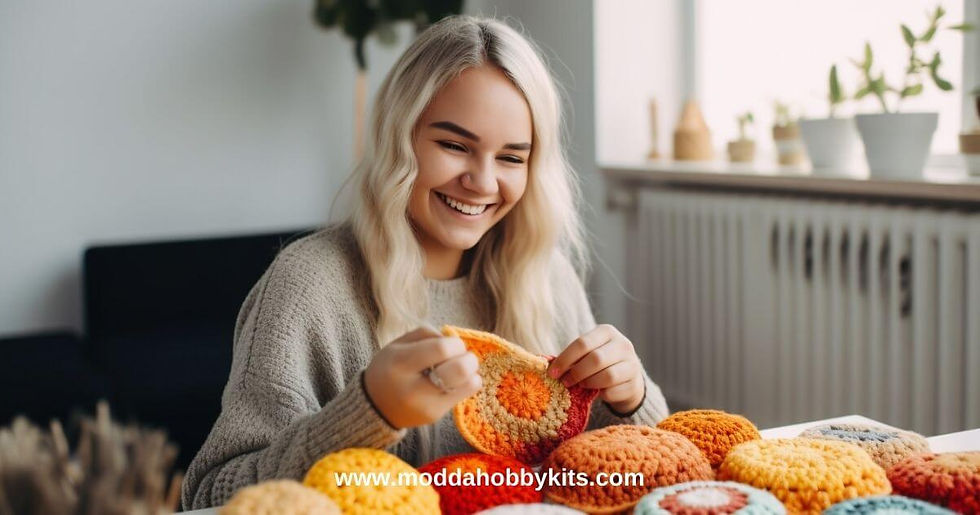
Stranded Colorwork
Another advanced technique for changing colors in crochet is stranded colorwork.
This technique involves carrying multiple yarn colors across the back of the work to create intricate patterns and designs.
Stranded colorwork is often used in projects such as hats, sweaters, and mittens.
To achieve a successful stranded colorwork project, it's important to pay attention to tension and ensure that the carried yarns aren't too tight or too loose.
Additionally, selecting contrasting colors can help make patterns stand out more prominently.
When working with two or more colors at once in crochet, it's also important to be aware of how much yarn is being used on each row or round.
This can help prevent running out of a certain color before the pattern calls for a change.

Why Choose Modda Crochet Kit as Your Crochet Kit for Beginners?
Crochet is a wonderful and relaxing hobby that can be enjoyed by people of all ages.
It's a fun way to create beautiful and practical items, such as scarves, blankets, hats, and more. If you're new to crochet, it can be difficult to know where to start.
That's where the Modda Crochet Kit for beginners comes in.
What's Included in Modda Crochet Kit for Beginners?
The Modda Crochet Kit for beginners includes everything you need to get started with crochet. Inside the kit, you'll find:
Crochet hooks in a range of sizes
High-quality yarn in various colors
Scissors and a yarn needle
A stitch marker and a tape measure
A handy storage tote bag to keep everything organized
Plus a Free Crochet Video Course
Benefits of Modda Crochet Video Course for Beginners
The Modda Crochet Kit also includes a free video course that's perfect for beginners.
Here are some of the benefits of this course:
Helpful Video Tutorials with Detailed Instructions
The Modda Crochet video course includes 18 detailed video tutorials that guide you through each step of the crochet process.
The videos are clear and easy to follow, so you can learn at your own pace.

Accessible from Anywhere with an Internet Connection
The video course is available online, which means you can access it from anywhere with an internet connection.
This makes it convenient to learn crochet on your own time, whether you're at home or on the go.
Free of Cost
The Modda Crochet video course is completely free of cost, which is great for beginners who don't want to invest a lot of money in a new hobby.
This makes it a great option for anyone who wants to try crochet without breaking the bank.
Learn at Your Own Pace
With the Modda Crochet video course, you can learn at your own pace. You can rewind and replay the videos as many times as you need to in order to master each technique.

Connect with the Course Community for Additional Support
Finally, the Modda Crochet video course also includes access to a community of fellow beginners who are also learning to crochet.
This community is a great place to get additional support, ask questions, and share your progress.
Customer Reviews of Modda Crochet Kit for Beginners with Free Video Course
Customers who have purchased the Modda Crochet Kit for beginners have had overwhelmingly positive things to say about the product.
They rave about the quality of the yarn and hooks included in the kit, as well as the helpfulness of the video course.

Customers also appreciate the convenience of being able to access the video course online and learn at their own pace.
If you're a beginner who wants to learn crochet, the Modda Crochet Kit with its included video course is an excellent choice.
With detailed video tutorials, quality materials, and a supportive community, you'll be well on your way to mastering this relaxing and rewarding hobby.
Conclusion
Changing colors in crochet is a simple technique that can add depth and beauty to your creations.
Whether you're alternating colors or using an intricate pattern, it's important to choose the right yarn and tools.
By following the tips and step-by-step guide outlined above, you'll be able to effortlessly change colors in rows, rounds, and even different stitches like a pro!
With practice, you may even explore advanced techniques like intarsia or tapestry crochet colorwork.
FAQ
How do I change colors in my Crochet project?
To switch the color of your yarn during a crochet project, simply work until you reach the last stitch before where you want to change colors. Then, drop the old color and pick up your new colored yarn. Insert the hook into the final stitch made with your previous color, wrap it around your new yarn, and pull through to complete that stitch.
Can I use different types of yarn when changing colors in crochet?
Yes! As long as you have two separate strands of compatible yarns, they can be used together while crocheting.
Why is it important to make sure my tension stays consistent when changing colors in crochet?
Maintaining consistent tension throughout a crochet project ensures even stitches and avoids distorted shapes or uneven edges - this is especially important when wanting to seamlessly transition between different-colored sections within an item’s design.
Are there any tips for determining which sequence might look best for a certain pattern or style when wanting to use multiple colors together?
A great way to seek inspiration for combining colors can come from examining nature's own palettes (such as leaf/flower combinations), but experimenting with swatches on smaller projects first will help perfect personal preferences before committing towards larger ones. Also trying out harmonious shades (analogous) could create soft blends whereas complementary hues offer striking contrasts that add excitement & interest to designs if done well so effort should definitely go into choosing the right palette ahead of time!





![How To End A Crochet Project [Video Tutorial]](https://static.wixstatic.com/media/4ce1a6_33b886f54ac24c77bf5ad91d58f8ef56~mv2.jpg/v1/fill/w_980,h_515,al_c,q_85,usm_0.66_1.00_0.01,enc_avif,quality_auto/4ce1a6_33b886f54ac24c77bf5ad91d58f8ef56~mv2.jpg)

Comments